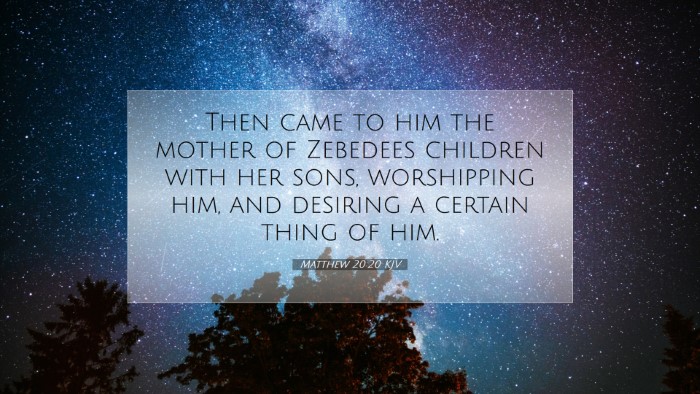Commentary on Matthew 20:20
Verse: "Then the mother of the sons of Zebedee came to him with her sons, kneeling before him and asking him for something." (Matthew 20:20, ESV)
Introduction
This passage introduces a significant moment in the ministry of Jesus, reflecting on the ambition and desires of the disciples and their families. The interaction between Jesus and the mother of James and John unveils deeper themes of power, servanthood, and the nature of the Kingdom of Heaven.
Contextual Background
In the context of Matthew 20, Jesus has just predicted His passion for the third time. The juxtaposition of His foretelling of suffering and the request of the mother of Zebedee’s sons highlights the disparity between worldly expectations of authority and the divine calling of Jesus' mission.
Role of the Mother
Matthew Henry notes the mother's boldness and zeal in approaching Jesus, indicative of the aspirations she has for her sons. She exemplifies the human inclination to seek honor and preferential treatment for loved ones in the Kingdom of God.
The Sons of Zebedee
Albert Barnes emphasizes the place of James and John, referred to as the 'sons of thunder.' Their association with their mother's request reveals their ambitions and the cultural valuations of leadership and authority during that time.
The Nature of the Request
The request made by the mother—asking for her sons to sit at the right and left hand of Jesus in His kingdom—demonstrates a misunderstanding of the nature of Jesus' mission. Adam Clarke argues that this reflects a common expectation of a political Messiah rather than the suffering servant that Jesus was destined to be.
Ambition vs. Servanthood
Herein lies a critical teaching moment: Jesus' response turns their ambition upside down. He does not scold them for their aspirations but redirects them toward the true nature of greatness in His Kingdom, which is rooted in servanthood.
Jesus' Response and the Teaching on Greatness
In Matthew 20:22-23, Jesus replies to the request by asking if they can drink the cup He is to drink. This metaphorical cup signifies the suffering and sacrifice He must endure. This moment illustrates the call to a higher understanding of discipleship: it often includes hardship and a willingness to sacrifice.
The Cup of Suffering
Matthew Henry comments on the 'cup of suffering' that all disciples must embrace, suggesting that true followers of Christ will share in His sufferings. Jesus clarifies that sitting on thrones involves more than glory; it requires a readiness to suffer alongside Him.
Theological Implications
This passage serves as a critical reminder to church leaders, students, and scholars about the cost of discipleship and the true nature of authority within the Christian community. Ambition is not in itself negative, but when it is misaligned with Christ's mission, it can lead to misunderstanding and conflict.
Community Reaction
Subsequent verses (20:24) showcase the reaction of the other disciples, who were indignant at James and John's request. Adam Clarke highlights that this reveals a common human flaw—envy and competitiveness, even among believers.
The Kingdom Model of Leadership
In response to this, Jesus teaches about leadership in the Kingdom: “Whoever wants to be great among you must be your servant” (Matthew 20:26). This radical notion challenges societal norms and redefines greatness as service. Pastoral leaders are encouraged to embody this principle in their ministries, leading by example.
Conclusion
Matthew 20:20 serves as a profound reminder of the tensions within the discipleship journey. The commentary from Matthew Henry, Albert Barnes, and Adam Clarke provides enriching insights into the struggle between worldly ambition and Christ’s call to servanthood. As believers seek positions of influence and authority, they must continually reflect on the model Jesus presented—a model that is interwoven with humility, sacrifice, and a commitment to serving others.
Practical Applications for Ministry
- Encourage a culture of servanthood within church leadership and community.
- Reinforce the understanding that true greatness in God's Kingdom may come through suffering and sacrifice.
- Facilitate discussions about ambition and how it can be aligned with God’s purpose.
- Model servant leadership to inspire others to follow Christ’s example.


